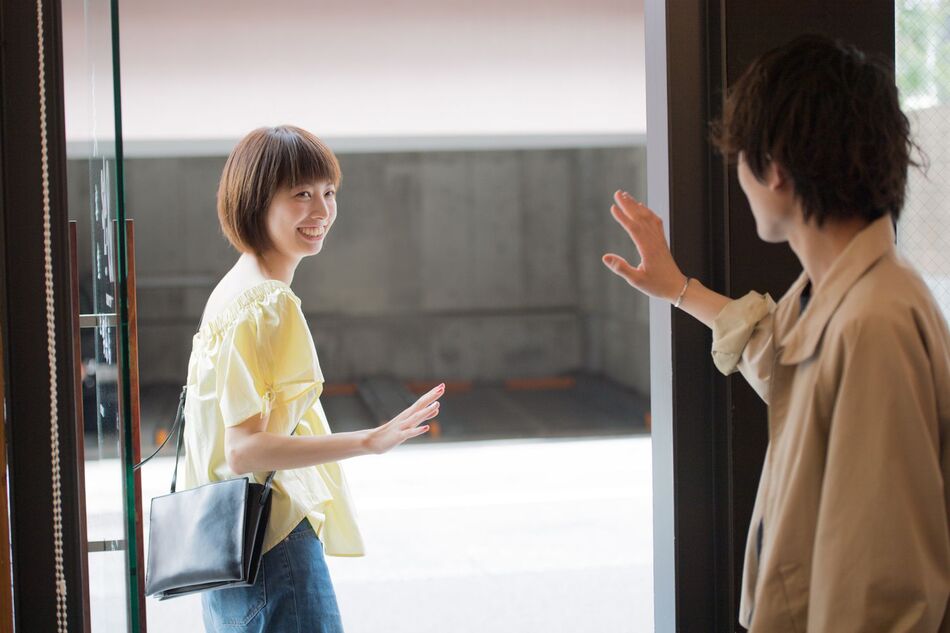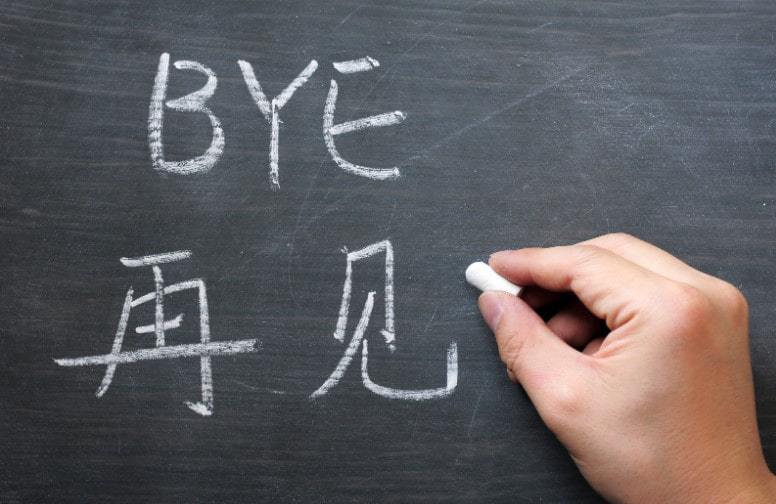Common Ways To Say Goodbye in Chinese

There isn’t just one way to say goodbye in Chinese—it depends on the situation! Whether you’re in a casual chat, a formal setting, or texting a friend, choosing the right farewell makes a difference. Here are some of the most commonly used goodbye phrases:
- 再见 (zài jiàn) – Goodbye
- 拜拜 (bài bài) – Bye-bye
- 明天见 (míng tiān jiàn) – See You Tomorrow
- 再联系 (Zài liánxì) – Let’s keep in touch
- 回见 (Huí jiàn) – See you when I get back
See also: Good Morning in Chinese
Casual Farewell Expressions

When saying goodbye in Chinese to friends, family, or close colleagues, you can use casual and friendly expressions. These phrases help keep things light and natural, whether you’re chatting in person or online. Here are some common informal goodbyes:
- 回头见 (huítóu jiàn) – See you later
- 下次见 (xià cì jiàn) – See you next time
- 改天见 (Gǎi tiān jiàn) – See you another day
- 先走了 (Xiān zǒu le) – I’ll leave first
- 走啦 (Zǒu la) – I’m off
- 先走了 (Xiān zǒu le) – I’ll leave first
- 溜了 (Liū le) – I’m out/Gotta run
- 有空再聚 (Yǒu kòng zài jù) – Let’s gather again when free
Formal Farewell Expressions

In formal settings, a more appropriate way of bye bye in Chinese language is crucial for conveying politeness and cultural sensitivity. These expressions are particularly important when addressing superiors, clients, or elders. Here are some commonly used formal goodbyes:
- 告辞 (Gào cí) – Take my leave
- 再会 (zài huì) – Farewell
- 告别 (Gào bié) – Bid farewell
- 辞行 (Cí xíng) – Take leave
- 珍重 (Zhēn zhòng) – Take care
- 失陪了 (Shī péi le) – Sorry to leave your company
- 后会有期 (Hòu huì yǒu qī) – Hope to meet again in the future
- 不打扰了 (Bù dǎ rǎo le) – I won’t disturb you anymore
Expressing Good Wishes When Parting

Often, a simple goodbye in Chinese feels insufficient; there’s an opportunity to convey genuine warmth. Extending good wishes adds a layer of sincerity, particularly appreciated by friends, colleagues, and family.
- 保重 (Bǎo zhòng) – Take care
- 一路顺风 (Yí lù shùn fēng) – Have a smooth journey
- 上路平安 (Shànglù píng’ān) – Have a safe journey
- 祝你好运 (Zhù nǐ hǎo yùn) – Good luck
- 保重身体 (Bǎozhòng shēntǐ) – Take care of your health
- 早日归来 (Zǎorì guīlái) – Come back soon
- 平安归来 (Píng ān guī lái) – Return safely
- 顺顺利利 (Shùnshùn lìlì) – May everything go smoothly
See also: Good Luck in Chinese
How To Say Bye Chinese Over Text or Social Media

With the rise of digital communication in today’s world, there are also informal and internet-friendly ways to say bye Chinese. Here are a few fun expressions you can use when texting on WeChat:
- 拜拜 (Bài bài) – Bye bye
- 88 (Bā bā) – Bye bye (numeric slang that sounds like “bye bye”)
- 886 (Bā bā liù) – Bye bye, take care (8=bā, 6=liù sounds like 了/le)
- 下次聊 (Xià cì liáo) – Chat next time
- 晚安 (Wǎn’ān) – Good night
- 回聊 (Huí liáo) – Chat later
- 下线了 (Xià xiàn le) – Going offline now
- 不聊了 (Bù liáo le) – Not chatting anymore
- 挂了 (Guà le) – Hanging up (from phone calls, now used in chat)
Common Questions About Saying Goodbye in Chinese

What’s Goodbye in Chinese?
The most common and standard way to say goodbye in Chinese is 再见 (zàijiàn), but there are many other variations depending on the situation.
How Do You Say Bye in Chinese?
For daily-life situations, 拜拜 (bàibài) is the easiest and most natural way to say bye Chinese. You can also use 88 (bā bā) when texting or chatting online.
What’s the Difference Between 再见 (Zàijiàn) and 拜拜 (Bàibài)?
再见 (zàijiàn) is more traditional and can be used in both formal and informal contexts, while 拜拜 (bàibài) is strictly casual and best suited for informal conversations.
If you’re also curious about how to say sorry and thank you in Chinese, be sure to check out other helpful articles in our blog!
Conclusion
Learning how to say goodbye in Chinese helps you navigate conversations naturally, whether in casual chats, formal settings, or online messages. With phrases like 再见 (zài jiàn) for general use, 拜拜 (bài bài) for friends, and 一路顺风 (yí lù shùn fēng) for travelers, you’ll always find the right farewell.
Want to sound even more fluent in any chats? Join GuruLango for expert tips and fun language-learning resources to learn Chinese right now!